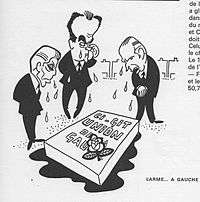Programme commun

The Programme commun (or 'Common Programme') was a reform programme, signed 27 June 1972 by the Socialist Party, the French Communist Party and the centrist Radical Movement of the Left, which provided a great upheaval in the economic, political and military fields in France. That alliance opened a political repositioning for the left that lasted 30 years, contributing particularly to the election of François Mitterrand in the presidential election of 1981. Between 1981 and 1983, he began putting Programme commun into action. [1]
The Keynesian-inspired policies led to an increase the fiscal deficit and the trade deficit. To keep France in the European Monetary System, a different approach was needed.
In March 1983, Mitterrand did a U-turn by cancelling the parts of Programme commun that had been already passed, which was sometimes referred to as the "austerity turn".[1]
References
- 1 2 "France's left-wing economic policy and the subsequent "austerity turn"". Cité de l'économie et de la monnaie. Retrieved 5 April 2015.